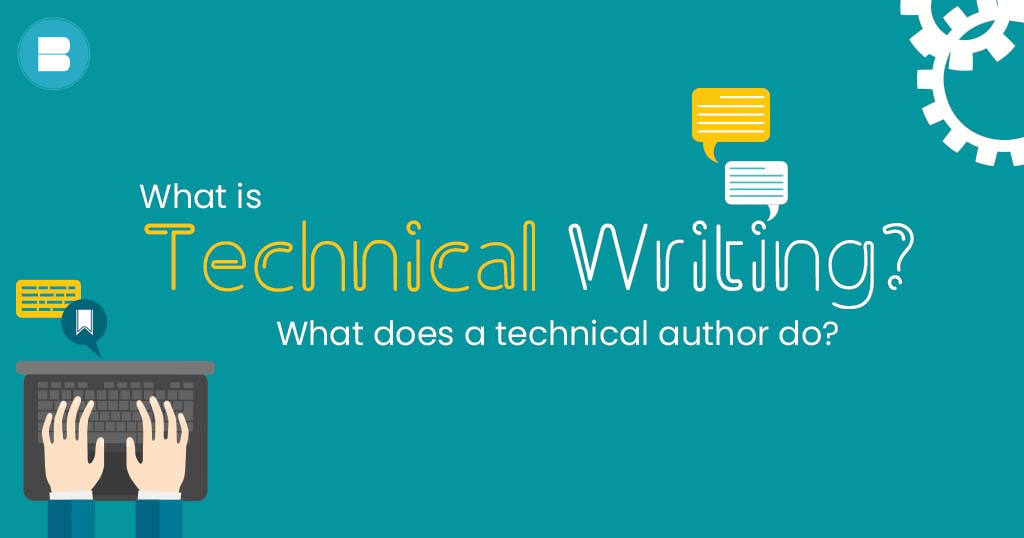
What is Technical Writing? What does a technical author do?
Have you ever read a manual or a technical report and wondered how the author managed to explain complex concepts in such a simple way? That’s the magic of technical writing! Technical writing is a specialized form of writing that is used to explain technical or scientific ideas to a non-expert audience. It’s all about taking complicated concepts and breaking them down into easy-to-understand terms. At its core, technical writing is about communicating complex information in a clear and concise manner. It involves using specialized language, formatting, and other tools to make information accessible to people who may not have the same level of expertise as the author. Technical writers may work on a variety of projects, including user manuals, product documentation, scientific reports, and more. Read: Here’s a Complete Difference Between Hybrid Publishing & Self-Publishing? Which is more suitable for you? A technical author is someone who specializes in technical writing. They are experts in their field and are skilled at translating technical concepts into plain language. Technical authors may work in a variety of industries, including engineering, technology, healthcare, and more. They use their knowledge and expertise to create documents, reports, and other forms of written content that can be easily understood by a non-expert audience. Some of the key skills that technical authors possess include excellent writing skills, the ability to research and analyze complex information, and a strong attention to detail. They must also be able to work with subject matter experts to gather information and ensure that the final product is accurate and effective. Whether you’re reading a user manual for a new gadget or a scientific report on the latest research, chances are that a technical author was involved in creating that document. Technical writing is an important field that plays a vital role in making complex information accessible to everyone. So the next time you come across a technical document, take a moment to appreciate the skill and expertise that went into creating it! Technical Writing Technical writing involves creating documents that explain complex ideas, procedures, or concepts in a way that can be understood by people who are not experts in the field. Technical writing can take many different forms, including reports, manuals, user guides, white papers, and online help systems. Technical writers are responsible for creating documents that are clear, concise, and easy to understand. Technical writing requires a specific set of skills, including strong writing abilities, attention to detail, and the ability to explain complex ideas in a simple and understandable way. Technical writers must also be able to work with subject matter experts to understand technical concepts and procedures and translate them into language that is accessible to a broader audience. Technical Report Writing Technical report writing is a type of technical writing that involves creating reports for scientific, technical, or business purposes. Technical reports can take many different forms, including research reports, feasibility studies, and project reports. Technical report writers must be able to gather and analyze data, present findings in a clear and concise manner, and make recommendations based on their findings. Technical Content Writer Technical content writers create content that is designed to inform, educate, or entertain readers about technical topics. Technical content writers must be able to explain complex concepts in a simple and understandable way. They must also be able to research technical topics and create content that is accurate, up-to-date, and relevant to their target audience. Technical Writing Skills Technical writing skills include the ability to write clearly and concisely, attention to detail, the ability to understand technical concepts and procedures, and the ability to work with subject matter experts. Technical writers must also be able to organize information in a logical and easy-to-understand manner and use tools and technologies to create and publish their documents. Technical Author A technical author is a type of technical writer who specializes in creating documentation for software applications, hardware products, and other technical products. Technical authors work closely with software developers, hardware engineers, and other technical professionals to understand the products they are documenting and create user manuals, help systems, and other documentation to support those products. Technical Blog Writing Technical blog writing is a type of technical content writing that involves creating blog posts about technical topics. Technical blog writers must be able to research technical topics, explain complex concepts in a simple and understandable way, and create engaging content that is relevant to their target audience. Technical blog writing is a great way to share technical knowledge, build an online community, and establish yourself as an expert in your field. You may also read: Top 10 Best Leadership Books in Literature to Inspire Your Journey What to keep in mind while technical writing? When it comes to technical writing, there are several points that writers should keep in mind to ensure that their content is clear, concise, and effective. Here are some of the most important points to keep in mind while technical writing: Know your audience: Before you start writing, you should have a clear understanding of your audience. What are their needs and expectations? What level of technical knowledge do they have? Knowing your audience will help you tailor your writing to their specific needs. Keep it simple: Technical writing can often involve complex ideas and concepts, but that doesn’t mean your writing should be difficult to understand. Use simple language, avoid jargon, and explain technical terms and concepts clearly. Use a logical structure: Your writing should have a clear and logical structure that makes it easy for readers to follow. Use headings, subheadings, and bullet points to break up the text and make it more readable. Be concise: Technical writing should be concise and to the point. Avoid unnecessary words and phrases, and stick to the essential information. Use visuals: Visuals such as diagrams, graphs, and charts can help to illustrate complex concepts and make your writing more engaging. Edit and proofread: Once you’ve written your content, make sure to edit and proofread it carefully. Check for spelling and grammar errors,…
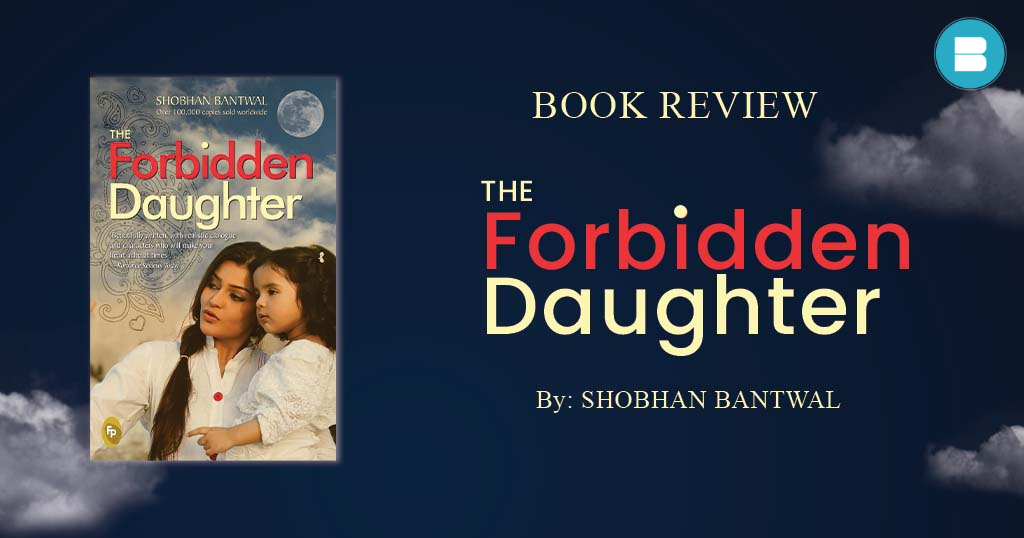
Book Review: The Forbidden Daughter a Book by Shobhan Bantwal.
Book – The Forbidden Daughter Author – Shobhan Bantwal Blurb – A goddess in the temple. A burden in the family. Children are a gift from God, they say. But do they really believe? Isha and Nikhil Tilak are expecting their second child. Hardwired to favour a grandson, Nikhil’s egotistical parents have resented and coldly rejected their first granddaughter. So ever since the day Isha discovered that she was expecting, this question has obsessed her: “Is it a boy? Or, God forbid, a girl?’ And finally, the answer is there on the gynaecologist’s screen—it’s a girl! What will Nikhil and Isha do now? As their decisions add to their nightmare, Nikhil is found murdered in cold blood. And their innocent unborn daughter is blamed for it. With her five-year-old at her heels, grief-stricken and relentlessly oppressed by her in-laws, who believe the baby to be a bad omen, Isha sets out on her own to build her life around her forbidden daughters. Will she be able to protect them from the grave dangers that lie ahead? A thrilling, captivating, and thought-provoking portrayal of the dark secrets hidden in Indian culture, this novel is bound to stir your conscience. To Order – The Forbidden Daughter a Novel by Author Shobhan Bantwal. Review – “The Forbidden Daughter” is a poignant novel by Shobhan Bantwal that delves into the deep-rooted gender bias and prejudices that exist in Indian culture. The story revolves around Isha and Nikhil Tilak, a couple who are expecting their second child. However, their joy is short-lived as they find out that they are going to have a daughter. In Indian culture, where male children are considered a symbol of pride and women are often seen as a burden, having a daughter can be a cause for disappointment and shame. The story is set in a small town in India, where the societal pressure to have a male child is overwhelming. The Tilaks are no exception, and Nikhil’s parents are disappointed that their first grandchild was a girl. When Isha gets pregnant again, they are hoping for a grandson. However, when they find out that the baby is a girl, their disappointment turns into resentment. As the story unfolds, the reader is taken on a journey through the trials and tribulations that Isha faces. She has to deal with the pressure of having a daughter, her husband’s murder, and the blame that is placed on her unborn child. In a society where a girl child is seen as a burden, Isha’s situation becomes more and more precarious. The in-laws refuse to accept the child, and the entire town is against them. The story is a reflection of the harsh reality of gender discrimination in India. The characters in the book are well-developed, and the author has done a remarkable job of bringing out the emotions of each one of them. Isha is portrayed as a strong woman who is determined to protect her children, no matter what the cost. Her struggle to provide for her children, both financially and emotionally, is heart-wrenching. The story also highlights the bond between a mother and her children and the sacrifices that a mother is willing to make for her children. The author Shobhan Bantwal has also skillfully woven in themes of family, love, and sacrifice. The book is not just about the struggles of Isha and her daughters but also about the relationships between family members. The author shows how the Tilak family is torn apart by their biases and prejudices, and how it takes a tragedy to bring them together. Read: Here’s a list of Most Famous self-published authors in India. The writing style of the book is engaging, and the narrative is fast-paced, making it difficult to put the book down. The descriptions of the small town in India are vivid and transport the reader to the place. The author has also done an excellent job of creating suspense throughout the book, making the reader wonder what will happen next. “The Forbidden Daughter” is a powerful book that tackles a sensitive issue with sensitivity and grace. The book by Shoban Datwal is a wake-up call to the Indian society to recognize the worth of a girl child and to break free from the chains of gender discrimination. The book is a must-read for anyone who wants to understand the harsh realities of gender discrimination in India and the struggles of women who have to face it every day. Publish your book for free with BlueRoseONE and become a bestselling author. Don’t let your dream of becoming an author fade away, grab the opportunity now and publish your book – be it fiction, non fiction, poetry or more.
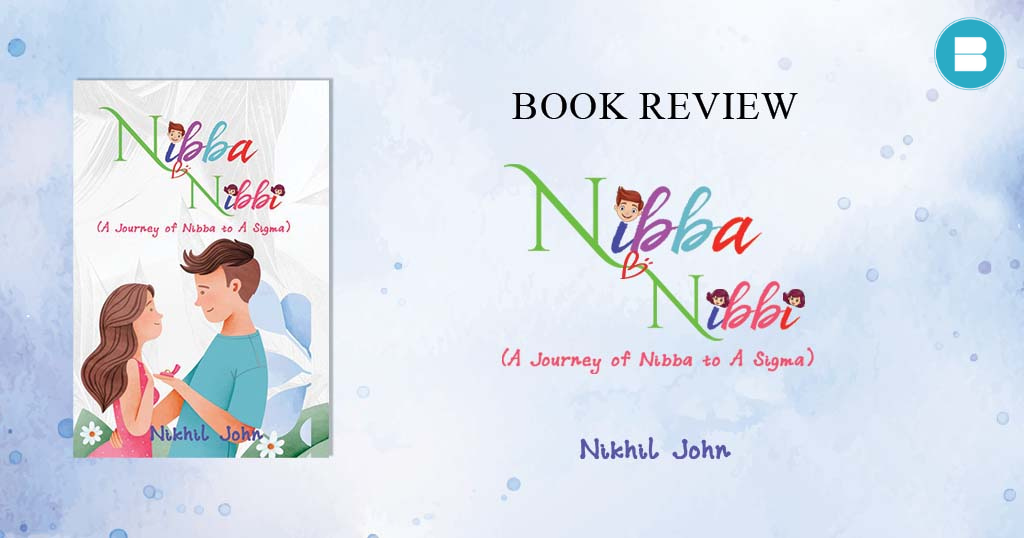
Book Review: Nibba Nibbi a Book by Author Nikhil John.
Book – Nibba NibbiAuthor – Nikhil John Blurb – “Nibba-Nibbi” itself is a mirror of the lives of youngsters. Nikhil has expounded most of the anticipated and unexpected events of one’s life in this book. The title seems to be very catapulting, as it has the sense to draw the attention of teenagers. The prelude has so much charm and emotion that anyone will willingly follow the poet through the dreams that lead him from a Nibba to a Sigma. He bequeaths his body to the worms and beetles and urges his tomb to be raised above her after his breakup. It is quite evident to witness the sentiments evolving. The behavioural aspects of human beings, viz., pain, poignancy, solitude, and familiarity, are projected to the readers in a magnificent way. The youthful poet Nikhil John has perfectly put the task to execution when he goes on to scale the young generation on his parameters of perception in this present period. ‘Nibba-Nibbi’ is here to win the hearts of a million youth and teenagers, especially lovers and broken-hearted ones, and it would surely fascinate young minds too. To Order Nibba Nibbi a Book by Author Nikhil John Now from BlueRoseONE Store. Click Here… Review – Nibba Nibbi, a book by Nikhil John, is a collection of poems that explores the lives of young people in modern society. The author has succeeded in capturing the essence of youth through his poetry, expressing the pain, poignancy, solitude, and familiarity that many people experience during this stage of life. The book’s title, Nibba Nibbi, is an intriguing one that draws the reader’s attention immediately. The word “Nibba” is a slang term used by young people in India to refer to a close friend, while “Nibbi” is the female counterpart of the term. The title is apt, as the poems in the book reflect the lives of young people and the relationships they form with their friends and loved ones. The book is divided into several sections, each of which focuses on a different aspect of youth. The first poem, titled “Lust less Love,” is a captivating first poem of the book. The author uses vivid imagery to describe his thoughts about a girl he saw for the first time. The book is filled with poems that reflect the ups and downs of love, friendship, and life. These poems are powerful expression of the pain that many young people feel when they experience the rollercoaster of emotions in their life as a young adult. The author’s use of vivid imagery and metaphor makes the poems all the more poignant. One of the most interesting poem is “Sedulous suitor” which oozes boderline sensuality with a hint of calmness. The poem describes a romantic evening between two lovers sitting on a wooden bench in a park. The poem’s protagonist shares a cigarette and a cup of tea with their partner while embracing her, feeling the scent of her hair. The setting is tranquil and calming, with nature surrounding them. The speaker then expresses their passion for their partner, saying that her skin breathes for them. The partner responds with affection, calling the speaker “dumbo” and telling them that her soul breathes for them. This exchange seems to deepen their connection. Read: Here’s a list of 10 Best Libraries in India for Bookworms that you must visit. The book also explores the theme of identity. Another poem that grabs the readers’ attention is “She still Loves me“. The poem is a short and sweet expression of the speaker’s longing to rekindle a past relationship with someone who still loves them. The use of repetition in the first two lines, “But she still loves me/ I want to get her back,” emphasizes the speaker’s desire and determination to make things work. The imagery of the phone calls, text messages, and late-night video calls creates a sense of nostalgia and longing for the intimacy and connection the couple once shared. The mention of coffee and cigarettes adds to the romantic and bittersweet tone of the poem, as it suggests that the couple used to enjoy the simple pleasures of life together. The phrase “Every single puff of life” is a powerful metaphor for the enjoyment and appreciation of life’s small moments, which the couple used to share. The speaker’s conviction that their former partner still loves them is reinforced by the description of their eyes having “a story to announce the love,” which suggests that their love is visible and undeniable. One of the most impressive aspects of Nibba Nibbi is the author’s use of language. Nikhil John has a gift for writing poetry that is both beautiful and accessible. His use of metaphor and imagery is subtle but powerful, and his poems are easy to understand without sacrificing depth or complexity. This is a difficult balance to achieve, but Nikhil John has done it admirably. Another notable aspect of the book is its relevance to young people today. The themes explored in Nibba Nibbi are ones that many young people can relate to, such as heartbreak, loneliness, and identity. The book is sure to resonate with many readers, especially those who are going through similar experiences. Read: Complete Guide on how to publish short stories in minutes on BlueRoseONE.com In conclusion, Nibba Nibbi is an excellent book that explores the lives of young people in modern society. The book’s poems are powerful expressions of the pain, poignancy, solitude, and familiarity that many young people experience. Nikhil John’s use of language is impressive, and his ability to write poetry that is both beautiful and accessible is commendable. Nibba Nibbi is sure to win the hearts of a million youth and teenagers, especially lovers and broken-hearted ones, and it would surely fascinate young minds too. Publish your book for free with BlueRoseONE and become a bestselling author. Don’t let your dream of becoming an author fade away, grab the opportunity now and publish your book – be it fiction, non fiction, poetry or more.
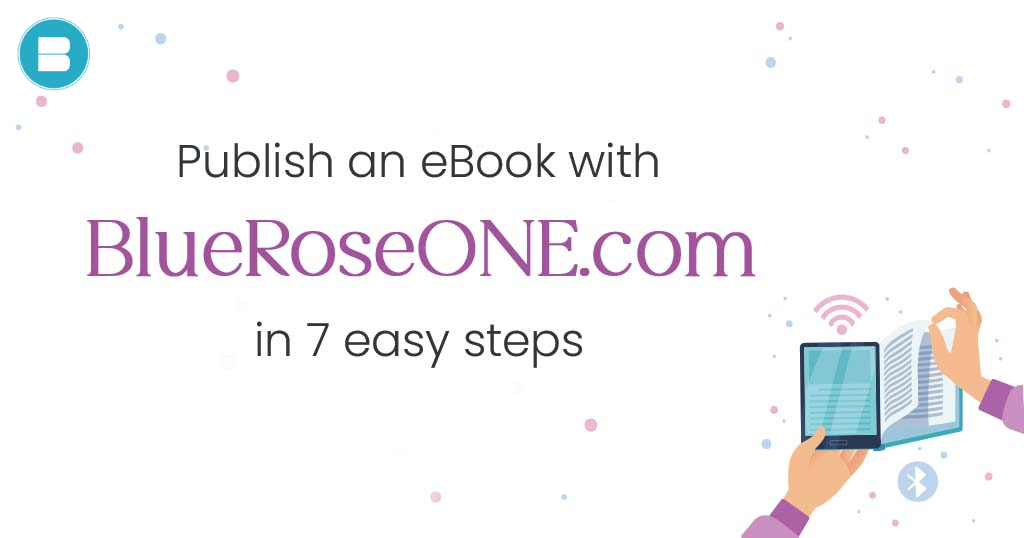
Publish an eBook with BlueRoseONE.com in 7 easy steps.
As technology continues to advance, eBooks have gained tremendous popularity in the literary world. These digital books have revolutionized the way writers and readers interact, making it easier than ever to share and consume literature. For authors, eBooks present a unique opportunity to showcase their work to a broader audience, while readers enjoy the convenience of accessing countless books from the comfort of their homes. In this blog, we’ll walk you through seven straightforward steps to publishing an eBook with BlueRoseONE.com, a leading platform for selling and distributing digital books. Read: Learn how to self publish a book using BlueRoseONE DIY platform. So, whether you’re an established writer or an aspiring author, follow these simple steps to get your eBook into the hands of readers worldwide. With BlueRoseONE.com, you can effortlessly sell and distribute your eBook online, giving your work the exposure it deserves. So, let’s get started and turn your literary dreams into a reality! Step 1: Register and Create an Account The first step to publishing your eBook with BlueRoseONE.com is to register and create an account. Simply visit the website and click on the “Register” button. Fill out the necessary information, including your name, email address, and a password, and then click “Register.” Step 2: Click on “Publish With Us” Once you have created an account, navigate to the top right corner of the website where you will see a yellow button labeled “Publish With Us.” Click on this button to begin the publishing process. Step 3: Choose Your Publishing Option When you click on “Publish With Us,” you will be given two options: “Paperback” or “eBook.” Since we are focusing on publishing an eBook, select the eBook option. Step 4: Fill Out the Required Information The next step is to fill out the required information about your eBook. This will include the title, author name, book description, genre, and more. Be sure to provide accurate and compelling information that will entice readers to purchase your eBook. Step 5: Create Your eBook Cover Your eBook cover is one of the most important elements of your eBook. It needs to be eye-catching and compelling in order to attract potential readers. BlueRoseONE.com provides an interface that allows you to create your eBook cover easily. You can either use one of their pre-made templates or upload your own cover design. Step 6: Upload Your Formatted File After you have created your eBook cover, it’s time to upload your formatted file. BlueRoseONE.com provides several formatting options to choose from, including ePub and PDF. If you have already formatted your eBook, you can simply upload the file in the appropriate format. Step 7: Choose Your Publishing Package The final step is to choose your publishing package. BlueRoseONE.com offers several different packages, ranging from basic to premium. Each package includes different features and benefits, such as marketing and promotion, editing services, and more. Choose the package that best fits your needs and budget. Congratulations! Your eBook is now ready to be published and sold on BlueRoseONE.com. But your work isn’t done yet. In order to make sure your eBook is successful, you will need to promote it to potential readers. Here are a few tips for promoting your eBook: Use Social Media: Social media platforms such as Facebook, Twitter, and Instagram provide excellent opportunities to promote your eBook. You can share your eBook cover, book description, and buy links with your followers. Social media can help you reach a broader audience and allow potential readers to learn more about your book. Offer Free Samples: Providing a free sample of your eBook to potential readers is a great way to entice them to purchase the full eBook. Offering a chapter or excerpt can give readers a taste of your writing style and allow them to see if the book is something they’d enjoy before purchasing. Create a Website: Creating a website to promote your eBook can be an effective way to increase visibility and gain readership. The website should include information about the book, author bio, and links to purchase the eBook. You can also use your website to blog about your writing journey and provide updates about your upcoming works. Collaborate with Other Authors: Collaborating with other authors in your genre is an effective way to expand your audience and increase sales. You can promote each other’s eBooks through social media, cross-promotion on websites, and other marketing techniques. In addition to promoting your eBook, it’s important to continually update and improve your writing skills. Read other eBooks in your genre, take writing classes, and attend writing conferences to improve your craft. Ebook publishing is important for several reasons. First, it provides a way for authors to get their work out to a wider audience. Ebooks can be easily distributed and accessed by readers all over the world, making it easier for authors to reach a global market. Second, ebook publishing provides a more affordable option for readers. Ebooks are often cheaper than their print counterparts, making them accessible to a wider range of people. Third, ebook publishing is environmentally friendly. With no need for paper or ink, ebooks have a much smaller carbon footprint than traditional print books. Fourth, ebook publishing allows for easy updates and revisions. Unlike print books, ebooks can be easily updated with new information or corrections, making it easier for authors to keep their work up-to-date. Read: A complete guide on how to publish short stories in minutes with BlueRoseONE.com Finally, ebook publishing provides a way for authors to retain more control over their work. With traditional publishing, authors often have to give up a lot of control over their book, from the cover design to the editing process. With ebook publishing, authors can retain more control over their work and make decisions about the formatting, cover design, and other aspects of their book. Publish your book for free with BlueRoseONE and become a bestselling author. Don’t let your dream of becoming an author fade away, grab the opportunity now and publish your book – be it fiction, non fiction, poetry…
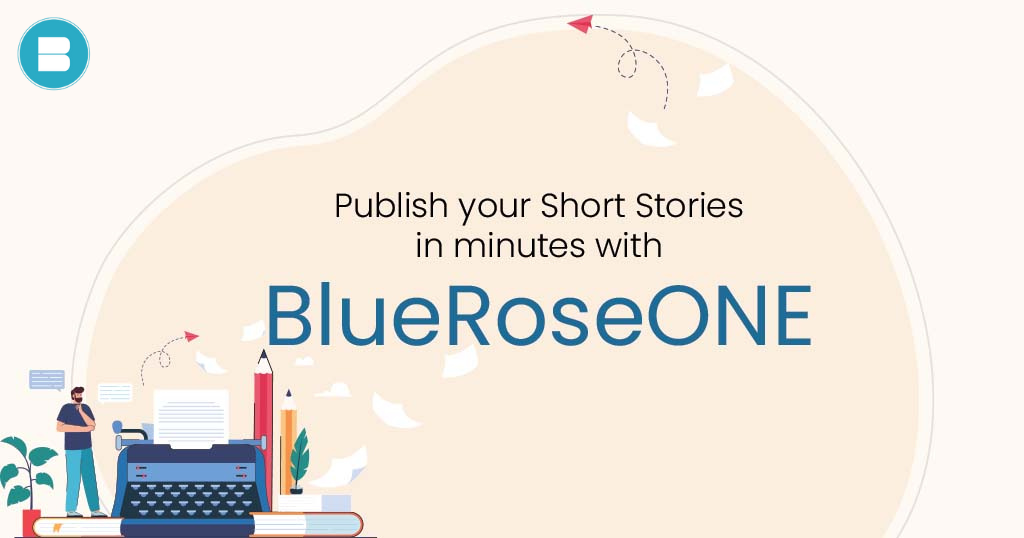
Publish your Short Stories in minutes with BlueRoseONE.com
Short stories are tiny universes of imagination that capture a single moment, character, or concept, and transport us to different worlds with just a few words. These little gems of literature are prized for their ability to tell a complete story in a limited space. From the depths of horror to the heights of romance, short stories come in all shapes and sizes, each one a miniature masterpiece of storytelling. They are the literary equivalent of a bite-sized treat, meant to be consumed in one sitting, yet leaving a lasting impression that lingers long after the last word has been read. Short stories are an art form that demands precision and creativity. Each word must carry its weight, and every sentence must serve a purpose. They are a testament to the power of storytelling, capable of transporting readers to different worlds, touching their hearts, and challenging their perceptions. Whether it’s a moral tale for children or a gripping mystery for adults, short stories are a testament to the versatility and beauty of the written word. Read: A complete guide on how to self publish a book using BlueRoseONE DIY platform. So, the next time you’re looking for a quick literary escape, reach for a short story and let your imagination soar. Whether you are a seasoned writer or just starting out, publishing your short stories can be a daunting task. Fortunately, there are online platforms like BlueRoseONE that make it easy to publish your short stories and share them with the world. BlueRoseONE is an online platform that allows you to publish your short stories quickly and easily. With a user-friendly interface and simple navigation, you can upload your stories and publish them in minutes. BlueRoseONE provides a platform for all genres of short stories, including moral stories, horror stories, funny stories, and mystery stories. One of the great features of BlueRoseONE is the ability to upload short stories with pictures. This is particularly useful for children’s stories or stories with a visual element. You can also find and read short stories with pictures from other writers on the platform. Another benefit of BlueRoseONE is the ability to share your stories on social media platforms like Facebook and Twitter. This allows you to reach a wider audience and promote your work. Additionally, you can connect with other writers on the platform and share feedback and support. BlueRoseONE also provides resources and tips for writers to improve their craft. Whether you are looking for writing prompts, tips for writing short stories, or advice on how to get published, BlueRoseONE has you covered. You may also like: 5 Act Structure: Definition, Examples and More Here are some of the key features of BlueRoseONE that make it an ideal platform for publishing your short stories: User-Friendly InterfaceBlueRoseONE has a simple and intuitive interface that makes it easy to upload and publish your short stories. The process is straightforward and can be completed in just a few minutes. Multiple GenresBlueRoseONE caters to a wide range of genres, including moral stories, horror stories, funny stories, and mystery stories. This means that no matter what type of short story you have written, there is a platform available for you to publish it. Pictures and IllustrationsThe ability to upload pictures and illustrations with your short story is a unique feature of BlueRoseONE. This is particularly useful for children’s stories or stories with a visual element. You can also find and read short stories with pictures from other writers on the platform. Social Media IntegrationBlueRoseONE allows you to share your short stories on social media platforms like Facebook and Twitter. This is a great way to promote your work and reach a wider audience. Community SupportBlueRoseONE has a community of writers who are supportive and provide feedback on your work. You can connect with other writers on the platform and share your work for feedback. Resources and Tips for WritersBlueRoseONE provides resources and tips for writers to improve their craft. Whether you are looking for writing prompts, tips for writing short stories, or advice on how to get published, BlueRoseONE has you covered. You may also read: How to Publish a Book? | Publish Your Book | BlueRoseOne Here are the steps how you can publish your short story on the BlueRoseONE platform – Register and create your account on www.blueroseone.com: To begin, you’ll need to sign up for an account on BlueRoseONE. You can do this by visiting their website and following the prompts to create an account. Click on the ‘Publish With Us’ button: Once you’ve created your account, go to the top right corner of the page, where you’ll see a yellow button that says ‘Publish With Us.’ Click on this button to start the publishing process. Choose between Paperback & Ebook: After clicking the ‘Publish With Us’ button, you’ll be given two options to choose from – paperback or ebook. Select the option that is most suitable for you. Fill out the necessary information: The next step is to fill out all the required information about your book, including the title, information about the book, information about the author, genre, paper quality, and more. Design your book cover: Once you’ve filled out all the necessary details about your book, you can move on to designing the cover. You can use the interface provided by BlueRoseONE to create your cover design, or you can upload a cover that you’ve already created. Format your book file: After designing your cover, the next step is to format your book file. BlueRoseONE provides several formats that you can choose from, or you can upload a formatted PDF file. Select a package and accept the terms and conditions: Finally, select a package that is suitable for you, review and accept the terms and conditions, and your book will be published on BlueRoseONE! Read: What is Amazon Kindle Publishing? Learn A to Z about Kindle Direct Publishing. In conclusion, if you are looking to publish your short stories in English, BlueRoseONE is a great platform to consider. With its user-friendly interface, ability to upload pictures, social media…
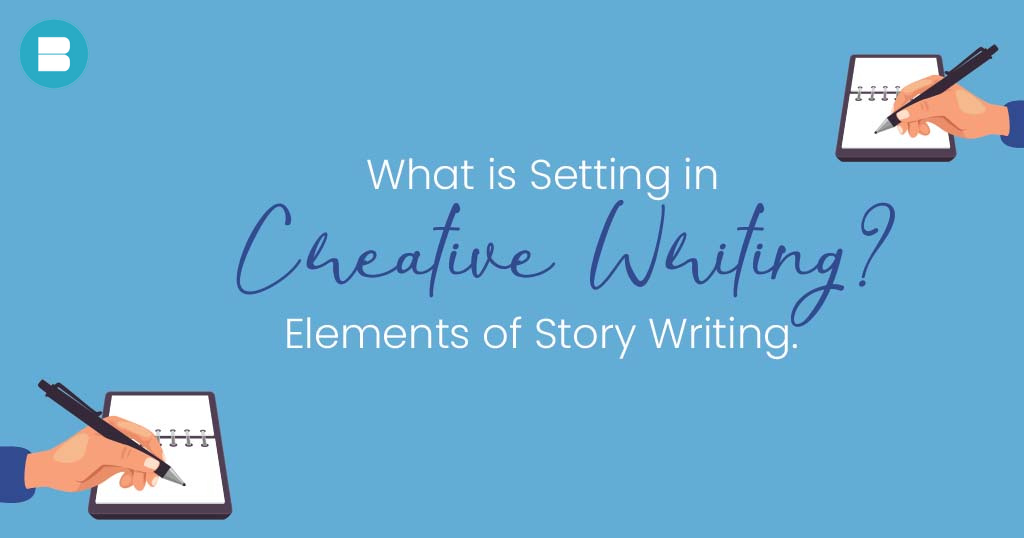
What is Setting in Creative Writing? Elements of Story Writing.
Setting in creative writing is an essential element of writing that creates the backdrop for a story. It refers to the physical location, time, and environment in which the story takes place. The setting of a story can be an important aspect that shapes the characters and events of the story. In this blog, we will discuss what setting is and how it can be used effectively in creative writing. Setting of the Story: The setting of a story can be defined as the time, place, and environment in which the events of the story take place. It can be a specific geographic location, such as a city, country, or even a fictional world. The setting can also include the time period, such as the past, present, or future. Moreover, the setting can include the physical environment, including the climate, terrain, and natural features. let’s explore the concept of setting in creative writing with an example. Consider the following excerpt from “To Kill a Mockingbird” by Harper Lee: “Maycomb was an old town, but it was a tired old town when I first knew it. In rainy weather the streets turned to red slop; grass grew on the sidewalks, the courthouse sagged in the square. Somehow, it was hotter then: a black dog suffered on a summer’s day; bony mules hitched to Hoover carts flicked flies in the sweltering shade of the live oaks on the square. Men’s stiff collars wilted by nine in the morning. Ladies bathed before noon, after their three-o’clock naps, and by nightfall were like soft teacakes with frostings of sweat and sweet talcum.” Read: What is Narrative Writing? Here’s a list of Elements in Creative Writing. In this excerpt, we can see that the setting of the story is Maycomb, a small town in Alabama. The author provides us with vivid descriptions of the town’s physical environment, such as the rainy weather that turns the streets to red slop and the grass growing on the sidewalks. We can also see that the setting is in the past, as the author uses phrases such as “when I first knew it” and references to Hoover carts and stiff collars. The author also includes descriptions of the natural features, such as the live oaks on the square, which helps to create a sense of place for the reader. The setting in this example is an essential element of the story, as it creates a specific atmosphere and mood that complements the events and themes of the story. The description of Maycomb as a tired old town with sagging buildings and sweltering heat helps to establish a sense of the town’s decay and stagnation, which is a central theme of the novel. Additionally, the setting is used to highlight the characters’ emotions and relationships with each other and their environment. You may also read: About the Author Sudha Murthy: Inspiring Life and Literary Legacy. Setting as a Character: In some stories, the setting can also function as a character. In these cases, the setting takes on a life of its own and influences the events and characters of the story. For example, a story set in a small town with oppressive heat and drought can create a tense and claustrophobic atmosphere that affects the characters’ behavior and choices.let’s explore the concept of setting as a character in creative writing with an example. Consider the following excerpt from “The Shining” by Stephen King: “The Overlook Hotel was his own invention, the site being inspired by a dream he had during a family vacation at Rocky Mountain National Park in Colorado. The hotel’s fictional location of Sidewinder, Colorado, is situated on the actual location of Estes Park, where King had stayed with his wife Tabitha in the Stanley Hotel, during the summer of 1974.” In this example, we can see how the setting of the story – the Overlook Hotel – can function as a character. Throughout the novel, the hotel takes on a life of its own, influencing the events and characters of the story. The hotel’s eerie, isolated location in the Rocky Mountains, along with its history of violence and tragic events, creates a foreboding atmosphere that affects the characters’ behavior and choices. Moreover, the hotel’s supernatural abilities, such as the ability to manipulate time and space, adds to its character-like presence in the story. The Overlook Hotel’s role as a character is central to the story, as it acts as both a physical and psychological antagonist to the protagonist, Jack Torrance. The hotel’s malevolent influence pushes Jack towards madness and violence, and ultimately drives the story towards its climactic conclusion. Thus, the concept of setting as a character in creative writing can be a powerful tool to enhance the atmosphere and mood of a story. When executed effectively, it can add depth and complexity to the story’s themes and characters. Settings of a Book: The settings of a book can be varied and diverse, depending on the author’s vision and the story’s requirements. A book can be set in a specific location, such as a city or a rural area, or it can be set in a fictional world with unique geography and rules. The time period can also vary, ranging from historical settings to futuristic ones. Moreover, the environment can be a significant factor in the setting, including elements such as weather, climate, and geography. “Carrie” by Stephen King is a great example of how setting can be an essential element of story writing. The novel is set in a small town in Maine, where Carrie White, the protagonist, lives with her abusive mother. The story is set in the 1970s and is set against the backdrop of social change and unrest in America. Read: A complete guide on how to publish short stories online for free. The setting of the small town is used to create a sense of isolation and claustrophobia that contributes to the tension and horror of the story. The town is portrayed as a conservative and oppressive community that is intolerant of…
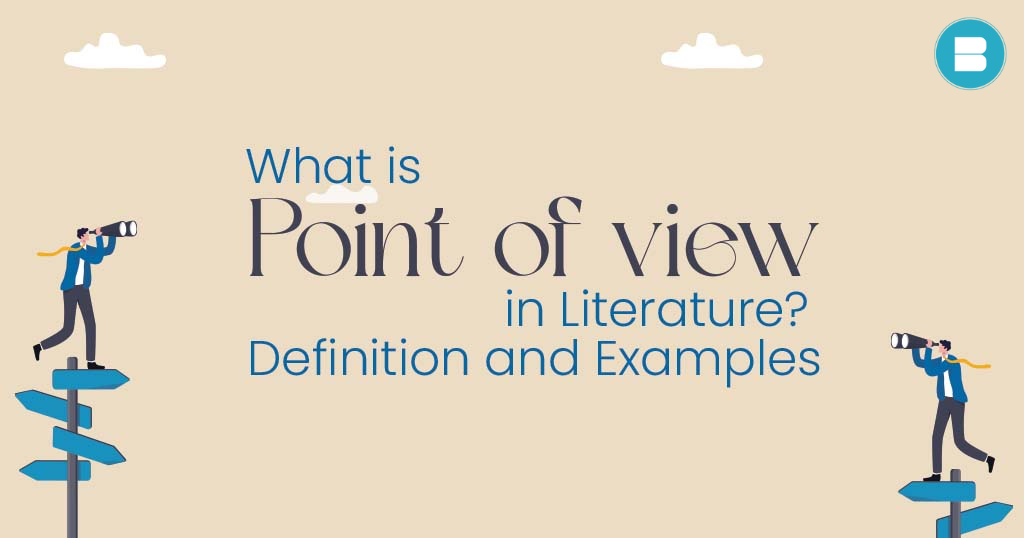
What is Point of view in Literature: Definition and Examples
Point of view (POV) is the perspective from which a story is narrated or told. It is the way in which the author chooses to present the events, characters, and themes of the story to the reader. Point of view can greatly affect how a story is perceived and experienced by the reader. There are several different types of point of view in literature, including first person, second person, and third person. You may also like: Literary Elements: A Complete List of Powerful Literary Devices First Person Point of View: First person point of view is a popular choice for writers because it creates a strong connection between the reader and the narrator. By using “I” to refer to the narrator, the reader can experience the story more intimately, feeling as if they are experiencing the events firsthand. This can create a sense of immediacy and intensity that is not always present in other points of view. However, the first person point of view also has some limitations. Because the reader is limited to the knowledge and experiences of the narrator, the story may be biased or subjective. The narrator may only be able to tell their own version of events, which can create an unreliable or incomplete story. Additionally, the first person point of view may not allow the reader to fully understand the motivations or perspectives of other characters in the story, as the narrator’s knowledge is limited. Read: Learn what are the main elements of Creative Writing. You may also like: Adjectives that starts with e | Words Popular in America Despite these limitations, first person point of view can be an effective tool for creating an engaging and personal narrative. By using this point of view, authors can create characters that are relatable and engaging, drawing the reader into the story and keeping them invested in the outcome. Additionally, first person point of view can be used to create a unique voice or style for the narrator, allowing the reader to experience the story in a way that is unique and compelling. Example: “The Catcher in the Rye” by J.D. Salinger is written in first person point of view. The narrator, Holden Caulfield, tells the story of his experiences after being expelled from prep school. Second Person Point of View: Second person point of view is unique in that it directly addresses the reader, making them a character in the story. This can create an immersive experience and an intimate connection between the reader and the story. The reader is placed in the position of the protagonist, experiencing the story as if it were happening to them. However, the second person POV can be challenging to sustain for an entire story or novel because it can quickly become tiresome or feel unnatural. Using “you” for extended periods can also distance the reader from the story, as it may become too obvious that they are being told what to do or think. For this reason, second person point of view is most commonly used in shorter works, such as short stories or poetry. Despite its challenges, second person point of view can be an effective tool for creating a unique and engaging reading experience. When used effectively, it can create a sense of immediacy and encourage the reader to actively engage with the story. It can also create a sense of intimacy, as the reader is placed in the position of the protagonist and experiences the story from a firsthand perspective. Read: What is Amazon Kindle Publishing (KDP)? A to Z about Kindle Direct Publishing. You may also like: 10 Best Fiction Books Set in America You Must Read Example: “If on a Winter’s Night a Traveler” by Italo Calvino is written in second person point of view. The reader is addressed directly as a participant in the story. Third Person Point of View: In third person point of view, the narrator is not a character within the story. Instead, the narrator is an observer who describes the actions, thoughts, and feelings of the characters. There are several different types of third person point of view, including limited, omniscient, and objective. Limited Third Person Point of View:In limited third person point of view, the narrator only knows the thoughts and feelings of one character. This can create a sense of intimacy with that character while still allowing for objectivity and distance from the events of the story.Example: “To Kill a Mockingbird” by Harper Lee is written in limited third person point of view. The narrator, Scout Finch, only knows her own thoughts and feelings, as well as those of her father Atticus. Omniscient Third Person Point of View:In omniscient third person point of view, the narrator knows the thoughts and feelings of all the characters in the story. This allows for a broad and comprehensive understanding of the events and themes of the story, but can also create a sense of distance from the characters and their experiences.Example: “Pride and Prejudice” by Jane Austen is written in omniscient third person point of view. The narrator knows the thoughts and feelings of all the characters, including Mr. Darcy and Elizabeth Bennet. Objective Third Person Point of View:In objective third person point of view, the narrator only describes the external actions and events of the story. There is no insight into the characters’ thoughts or feelings, creating a sense of objectivity and distance.Example: “The Old Man and the Sea” by Ernest Hemingway is written in objective third person point of view. The narrator only describes the physical actions of the old man and the marlin he catches. You may also read: What is Historical Fiction? Definition, Chracteristics and Impact In conclusion, point of view is an important element in literature as it can greatly affect the way a story is experienced by the reader. Understanding the different types of point of view can help readers to analyze and appreciate the nuances of a story’s narrative structure. Publish your book for free with BlueRoseONE and become a bestselling author. Don’t let your dream of becoming an author fade away, grab the opportunity now…
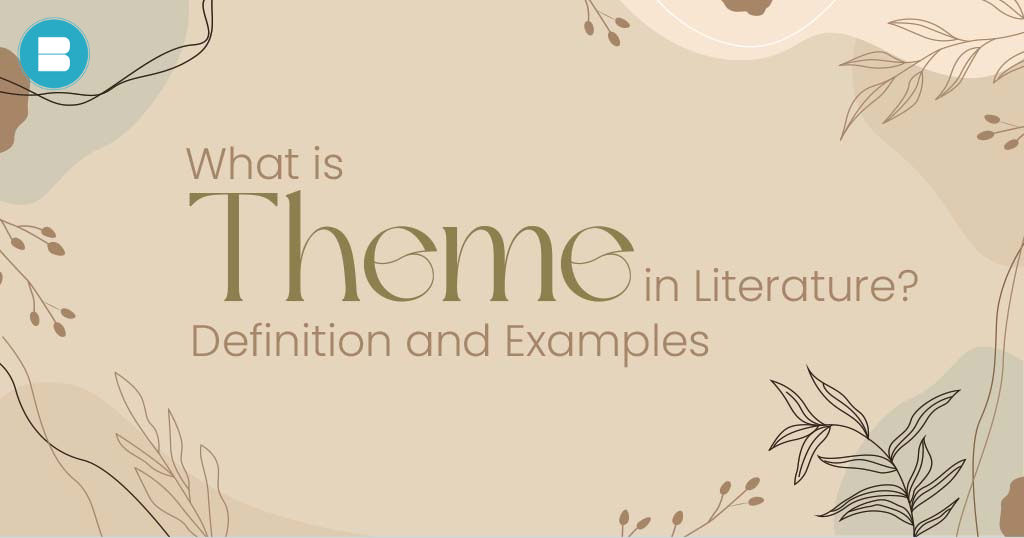
What is the theme in literature? Definition and Examples.
Theme in literature is an essential aspect of any story. It refers to the central idea or underlying message that the author conveys through the narrative. Themes in literature can be broad or specific, and they can be universal or specific to a particular time, place, or culture. In this blog, we will explore the definition of theme in literature and provide examples to help you understand this crucial element of storytelling. You may also read: What is Situational Irony? Definition, Examples and Tips for Writers What is Theme in Literature? Theme in literature refers to the central idea or underlying message that the author conveys through the narrative. It is a concept that is essential to any story, as it helps readers to understand the author’s perspective and the deeper meaning that the story communicates. While the plot, characters, and setting are all important elements of a story, the theme is what gives it meaning and resonance. One example of a theme in literature is the idea of redemption. Many stories explore the concept of redemption, where characters seek to atone for past mistakes and find a way to make amends. This theme can be seen in literature from all cultures and time periods, as it is a universal human experience. For instance, the novel “The Kite Runner” by Khaled Hosseini is a story that revolves around the theme of redemption. The story is set in Afghanistan and follows the life of a young boy named Amir, who is haunted by guilt over a past mistake that he made as a child. Amir’s best friend Hassan is brutally assaulted, and Amir does nothing to stop it. This event haunts Amir throughout his life, and he spends the rest of the story trying to find a way to make things right. The theme of redemption is evident throughout the story, as Amir seeks to atone for his past mistake and find a way to make things right with Hassan. He returns to Afghanistan, where he faces danger and uncertainty in his efforts to find Hassan’s son, Sohrab, and bring him to safety. Along the way, Amir is forced to confront his past and come to terms with the mistakes he has made. Another example of a theme in literature is the idea of the search for identity. Many stories explore the concept of identity, where characters seek to find their place in the world and understand who they are. This theme can be seen in literature from all cultures and time periods, as it is a universal human experience. One example of a story that explores the theme of identity is the novel “The Catcher in the Rye” by J.D. Salinger. The story follows the life of a young man named Holden Caulfield, who is struggling to find his place in the world. Holden is disillusioned with the world around him and feels disconnected from the people and events that surround him. Throughout the story, Holden’s search for identity is a central theme. He struggles to understand who he is and where he fits in, and he rebels against the societal norms that he sees as confining and restrictive. Holden’s journey of self-discovery is a powerful example of the theme of identity, as he seeks to find his place in the world and make sense of his own experiences. You may also like: How to Publish a Book | Publish Your Book | BlueRoseOne Examples of Themes in Literature: Here are some common themes in literature that you may have encountered in your reading: Love: Love is one of the most common themes in literature, and it can take on many different forms and meanings depending on the story being told. One way that love is often explored in literature is through the joy and happiness that comes with falling in love. Many stories focus on the excitement and wonder of two people who are just beginning to discover their feelings for each other. This can be a powerful and transformative experience for the characters involved, and it can create a sense of hope and optimism for readers.At the same time, love can also be explored through the pain and heartbreak that often accompanies it. Many stories focus on the difficulties and challenges that arise when relationships falter or fail, and the emotions that come with these experiences can be deeply felt by readers. This can be especially true when characters are forced to confront their own flaws and shortcomings, and the ways in which these shortcomings can affect their relationships with others.Ultimately, the theme of love in literature is a complex and multifaceted one, and it can be explored in many different ways depending on the author’s perspective and the story being told. Whether through the joys of new love or the pain of heartbreak, love is a universal human experience that resonates with readers and helps to make literature a powerful and meaningful art form. Loss: Loss is a common theme in literature that often explores the emotional pain and grief that comes with the experience of losing someone or something important. This can take many different forms, including the loss of a loved one, a relationship, or a way of life. In many cases, loss is an unavoidable and inevitable part of the human experience, and it can have a profound impact on the way we view ourselves, our relationships with others, and the world around us.One of the most common forms of loss in literature is the loss of a loved one. This can be a powerful and emotional experience that can leave characters feeling overwhelmed and alone. Whether it is the death of a parent, a child, or a spouse, the pain of loss can be a difficult and ongoing struggle for characters to deal with. In many cases, the experience of loss can lead characters to question their own mortality and the meaning of life itself.Another form of loss that is often explored in literature is the loss of a…
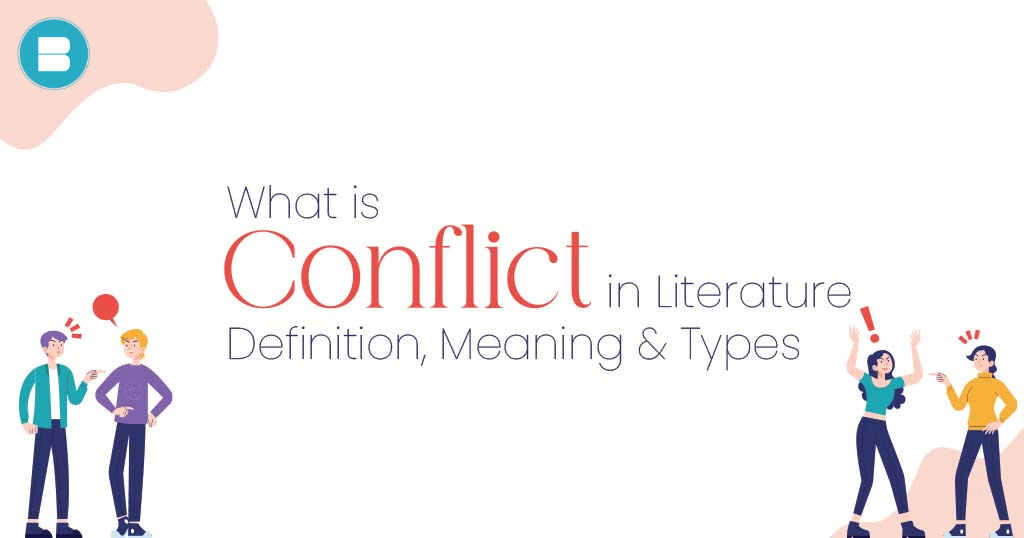
What is Conflict in Literature: Definition, Meaning & Types.
Conflict is a fundamental element of literature. It refers to the struggle between two or more opposing forces that drives the plot forward and creates tension and drama in the narrative. Without conflict, a story would be flat and uninteresting, lacking the complexity and depth that make it engaging and memorable. Read: Here’s a list of top 7 thriller books to read on Kindle Unlimited. In literature, conflict can take many forms and can arise from a variety of sources. Below, we’ll explore the different types of conflict and what they mean. Types of Conflict in Literature Man vs. Self: Man vs. Self is a type of conflict in which the primary struggle takes place within the mind of the character. This internal conflict can manifest in a variety of ways, including moral dilemmas, identity crises, and battles against personal fears or weaknesses.Moral dilemmas are a common form of Man vs. Self conflict, in which a character must make a difficult decision that challenges their values or beliefs. For example, a character may be faced with the choice of whether to tell the truth and risk hurting someone they care about, or to lie and protect them. This type of conflict can reveal the character’s moral compass and the principles they hold dear, as well as their ability to reconcile conflicting values.Identity crises are another form of Man vs. Self conflict, in which a character struggles to understand who they are and where they belong in the world. This can involve questions of gender, sexuality, race, or other aspects of identity that are fundamental to a person’s sense of self. For example, a character may be grappling with the realization that they are gay or transgender, and must come to terms with this aspect of their identity while also navigating the reactions of others. This type of conflict can be particularly poignant and relatable for readers who have experienced similar struggles.Finally, battles against personal fears or weaknesses can also create Man vs. Self conflict. This may involve a character overcoming a phobia or confronting a traumatic event from their past. For example, a character who is afraid of water may need to learn to swim in order to save someone they care about. This type of conflict can be particularly compelling because it requires the character to summon their inner strength and resilience in order to overcome the obstacles that they face. Man vs. Man: Man vs. Man conflict is one of the most common types of conflict in literature. It arises when two or more characters have opposing goals, values, beliefs, or desires that are irreconcilable, leading to a clash or struggle between them. This conflict can occur between protagonists and antagonists, or between two or more protagonists. It can also involve a power struggle, competition, or an attempt to thwart the other’s plans.For example, in William Shakespeare’s play “Romeo and Juliet,” the conflict between the two young lovers and their respective families is a classic example of Man vs. Man conflict. The feud between the Capulet and Montague families leads to the death of several characters, including Romeo and Juliet. The two lovers must navigate the conflict between their families while also dealing with their own personal struggles, such as their forbidden love and the pressures of societal expectations.Another example of Man vs. Man conflict can be seen in the novel “To Kill a Mockingbird” by Harper Lee. The story follows a young girl named Scout and her family as they navigate the racial tensions and prejudices of a small Southern town. The central conflict arises when Scout’s father, Atticus, defends a black man accused of rape, leading to hostility and backlash from many of the townspeople. Atticus must stand up for what he believes is right, even in the face of opposition and danger.Man vs. Man conflict can add tension and suspense to a story, as readers are invested in seeing how the characters will overcome their differences and whether or not they will achieve their goals. It can also provide opportunities for character development, as the characters must confront and overcome their flaws and biases in order to resolve the conflict. Man vs. Nature: In the man vs. nature conflict, the main character or characters face adversity and obstacles presented by the natural world. These obstacles can include natural disasters like floods, hurricanes, or earthquakes, as well as dangerous animals, extreme weather conditions, or harsh environments. The characters may have to fight for survival in the face of these challenges, using their wits, skills, and resources to overcome them.This type of conflict is often seen in adventure stories, survival tales, and wilderness narratives. It can provide an opportunity for characters to demonstrate their courage, resourcefulness, and resilience, as they must rely on their own abilities to survive in a hostile environment. It can also raise questions about humanity’s relationship with the natural world and the impact that humans have on the environment.For example, in the novel “The Call of the Wild” by Jack London, the main character Buck, a domesticated dog, is kidnapped and sold into the brutal world of the Alaskan wilderness during the Gold Rush. He must adapt to the harsh conditions and face the danger of wild animals in order to survive. The conflict between Buck and the natural world forces him to tap into his primal instincts and learn to live as a wild animal, ultimately leading to his transformation and growth as a character.In the movie “The Revenant”, the main character Hugh Glass, a frontiersman and fur trapper in the early 1800s, is left for dead by his fellow trappers after being mauled by a bear. He must survive alone in the harsh winter wilderness and face danger from both the natural world and hostile Native American tribes. The conflict between Glass and the natural world tests his limits and forces him to rely on his skills and determination to survive.In both examples, the man vs. nature conflict highlights the power…
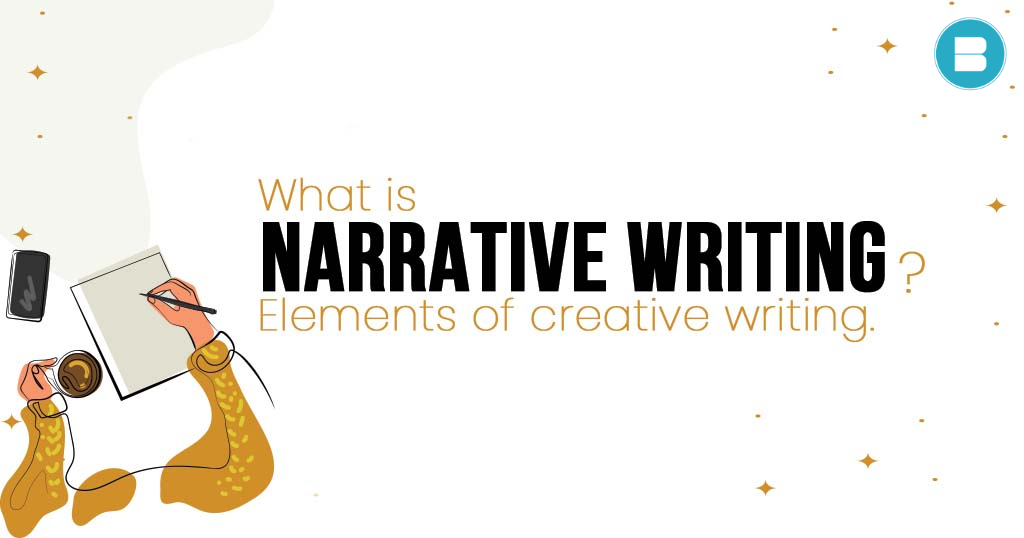
What is Narrative Writing? Elements of Creative Writing.
Narrative writing is a type of writing that involves telling a story through words. The story can take various forms, such as novels, short stories, memoirs, personal essays, and more. The primary goal of narrative writing is to create a vivid image of a person, place, or event using words, so that the reader can experience it in their mind’s eye. Narrative writing is different from other forms of writing because it has a plot, characters, and a setting. The plot is the sequence of events that make up the story, and it is what drives the narrative forward. Characters are the people or animals in the story who play a vital role in bringing the story to life, while the setting is the time and place in which the story takes place. Read: What are the main elements of Creative Writing! Click here to read full article. Narrative writing can serve various purposes, such as entertaining, educating, persuading, and inspiring. For example, a novel might entertain readers with a thrilling plot and relatable characters, while a personal essay might educate readers by sharing an author’s unique perspective on a topic. A persuasive narrative essay might aim to convince readers to adopt a particular point of view, while an inspiring memoir might motivate readers to overcome adversity and achieve their goals. Elements of Creative Writing There are several key elements that make up creative writing, and these apply to narrative writing as well. These elements include: Plot: The plot is the sequence of events in a story, and it’s what drives the narrative forward. It includes the exposition, rising action, climax, falling action, and resolution. Characters: Characters are the people or animals in a story. They can be major or minor, and they play a vital role in bringing the story to life. Setting: The setting is the time and place in which the story takes place. It can be a real or imaginary place, and it helps to create the mood and atmosphere of the story. Point of view: Point of view refers to the perspective from which the story is told. It can be first person (I), second person (you), or third person (he/she/they). Tone: Tone refers to the writer’s attitude towards the subject matter or audience. It can be serious, humorous, ironic, or sarcastic, among other things. You may also like: What is upfront fiction? Definition, Traits and Examples Types of Narrative Writing There are several types of narrative writing, including: Descriptive writing: Descriptive writing is a form of writing that uses sensory details to create a vivid image of a person, place, or thing. This type of writing helps the reader to experience the object being described in their mind’s eye. Descriptive writing is often used in fiction and creative nonfiction, but it can also be used in other forms of writing such as essays, journalism, and technical writing.For example, consider the following paragraph:“The sun had set over the ocean, casting a warm glow over the beach. The sand was still warm from the day’s heat, and the sound of the waves crashing against the shore created a soothing rhythm. The salty smell of the ocean mixed with the aroma of nearby food vendors, filling the air with a tempting scent.”In this paragraph, the writer uses sensory details to create a vivid image of the beach at sunset. The reader can picture the warm sand, hear the sound of the waves, and smell the salty ocean air. This type of descriptive writing allows the reader to experience the setting in a more immersive way. Narrative essay: A narrative essay is a type of essay that tells a story, often a personal one. It typically has a clear thesis statement that summarizes the main point of the essay. Narrative essays can be written in first or third person and often include dialogue and descriptive details to bring the story to life.For example, consider the following thesis statement for a narrative essay:“My trip to Paris taught me the importance of stepping outside of my comfort zone and embracing new experiences.”In this thesis statement, the writer sets up the main point of the essay, which is that their trip to Paris had a significant impact on them. Throughout the essay, the writer might describe their experiences in Paris, such as trying new foods, visiting famous landmarks, or meeting new people. Narrative story: A narrative story is a fictional story that tells a tale. It can be written in a variety of genres, including romance, science fiction, and horror. Narrative stories often have a clear beginning, middle, and end, with a plot that develops over time.For example, consider the following opening sentences of a narrative story:“Sarah had always loved the old house at the end of the street, with its peeling paint and overgrown garden. She never imagined that one day she would call it home.”In these opening sentences, the writer sets up the setting and the main character, Sarah. The reader is drawn into the story and is curious to find out what happens next. Narrative paragraph: A narrative paragraph is a type of writing that tells a story, typically in a few sentences or a few paragraphs. It can be used in various genres of writing, including fiction and creative nonfiction. The purpose of a narrative paragraph is to engage the reader’s imagination and emotions and create a vivid picture of a particular event, person, or place. It often includes sensory details, dialogue, and vivid descriptions to make the story come alive.For example, consider the following narrative paragraph:“The old man sat on the park bench, feeding the pigeons with a smile on his face. As he tossed bits of bread to the birds, memories flooded his mind. He remembered when he used to come to this park with his wife, holding hands and laughing. Now she was gone, but the park and the pigeons remained. He took a deep breath, feeling a sense of peace settle over him.”In this paragraph, the writer tells a story of an old man in…
